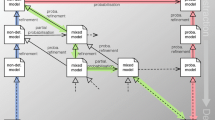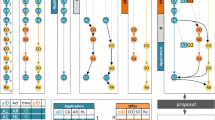Abstract
Recent research on qualitative reasoning has focussed on representing and reasoning about events that occur repeatedly. Allen's interval algebra has been modified to model events that are collections of convex intervals—a non-convex interval. Using the modified version of Allen's algebra, constraint-based algorithms have been investigated for finding feasible relations in a network of non-convex intervals.
In this paper, we propose to model recurring events as multi-point events by extending Vilain and Kautz's point algebra. We then propose an exact algorithm (based on van Beck's exact algorithm) for finding feasible relations for multi-point event networks. The complexity of our method is compared with previously known results both for recurring and nonrecurring events. We identify the special cases for which our multi-point based algorithm can find exact solution. Finally, we summarise our paper with brief discussion on ongoing and future research.
Preview
Unable to display preview. Download preview PDF.
Similar content being viewed by others
References
Allen, J.: Maintaining Knowledge about Temporal Intervals. Communication of the ACM. 26(11) 1983 832–843
Allen, J. and Koomen, J.A.: Planning Using a Temporal World Model. Proceedings of the 8th International Joint Conference on Artificial Intelligence (IJCAI-83), California: Kaufman. 1983 741–747
Freuder, E.C.: A Sufficient Condition for Backtrack-Free Search. Journal of ACM. 29 1982 24–32
Gerevini, A. and Shamir, R.: Complexity and Algorithms for Reasoning about Time: A Graph-Theoretic Approach. Journal of ACM. 1992
Hayes, P.J.: The Naive Physics manifesto. Expert Systems, edited by Michie,D., Edinburgh U.Press. 1979
Al-Khatib, L.: Reasoning with Non-Convex Time Intervals. PhD dissertation, Florida Institute of Technology, Melbourne, Florida. 1994
Kohane, I.S.: Temporal Reasoning in Medical Expert Systems. MIT Laboratory for Computer Science, Technical Report TR-389, Cambridge. 1987
Kowalski, R.A. and Sergot, M.J.: A logic-based calculus of events. New Generation Computing. 4(1) 1986 67–95
Ladkin, P.: Time Representation: A Taxonomy of Interval Relations. Proceedings of AAAI-86, San Mateo: Morgan Kaufman. 1986 360–366
Ladkin, P. and Maddux, R.D.: On Binary Constraint Problems. Journal of ACM. 41(3) 1994 435–409
Ladkin, P. and Reinefeld, A.: Effective solution of qualitative interval constraint problems. Artificial Intelligence. 57(1) 1992 105–124
Mackworth, A.K.: Consistency in Networks of Relations. Artificial Intelligence. 8 1977 99–118
Van Beek, P.: Exact and Approximate Reasoning about Qualitative Temporal Relations. Technical Report TR-90-29, University of Alberta, Edmonton, Alberta, Canada. 1990
Vilain, M. and Kautz, H. Constraint Propagation Algorithms for Temporal Reasoning. Proceedings of AAAI-86, San Mateo; Morgan Kaufman. 1986
Author information
Authors and Affiliations
Editor information
Rights and permissions
Copyright information
© 1996 Springer-Verlag Berlin Heidelberg
About this paper
Cite this paper
Wetprasit, R., Sattar, A., Khatib, L. (1996). Reasoning with multi-point events. In: McCalla, G. (eds) Advances in Artifical Intelligence. Canadian AI 1996. Lecture Notes in Computer Science, vol 1081. Springer, Berlin, Heidelberg. https://doi.org/10.1007/3-540-61291-2_39
Download citation
DOI: https://doi.org/10.1007/3-540-61291-2_39
Published:
Publisher Name: Springer, Berlin, Heidelberg
Print ISBN: 978-3-540-61291-9
Online ISBN: 978-3-540-68450-3
eBook Packages: Springer Book Archive




